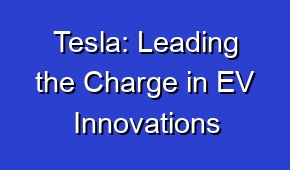Connected Cars

Connected cars are vehicles equipped with internet connectivity and integrated technologies that enable communication with other devices. They offer various benefits such as improved safety, efficiency, and convenience for drivers.
Connected Cars are revolutionizing the way we travel, making our journeys safer and more efficient. With advanced technology like artificial intelligence and internet connectivity, these cars can communicate with each other and with the surrounding infrastructure. This allows for real-time updates on traffic conditions and enables features such as automatic emergency braking and lane-keeping assistance. Smartphones can also be integrated with these cars, allowing drivers to remotely control various functions like locking and unlocking doors. Additionally, connected cars can provide valuable data on driving patterns and vehicle performance, helping manufacturers improve their products. As more vehicles become connected, the potential for innovation and improvement in the automotive industry is immense.
| Connected Cars: Vehicles equipped with internet connectivity for enhanced communication and functionality. |
| Connected cars leverage IoT technology to enable features like remote diagnostics and infotainment. |
| These smart cars use telematics systems to collect and transmit data for various purposes. |
| Connected cars improve safety by providing real-time traffic updates and emergency assistance. |
| Through vehicle-to-vehicle communication, connected cars can share information for safer driving. |
- Connected cars enable remote control of functions like locking/unlocking and starting the engine.
- Smartphone integration allows drivers to access apps and features directly from their car.
- Real-time location tracking in connected cars helps in theft recovery and fleet management.
- Connected cars facilitate over-the-air software updates for improved performance and new features.
- By leveraging big data, connected cars can provide personalized experiences and predictive maintenance.
What is a connected car and how does it work?
A connected car is a vehicle that uses internet connectivity to enhance its functionality and provide various services. It utilizes sensors, software, and internet connectivity to gather and exchange data, allowing it to interact with other devices, networks, and infrastructure.
Connected cars can collect real-time data about road conditions, traffic congestion, weather, and vehicle performance. This data can be used to optimize routes, improve fuel efficiency, provide remote diagnostics, and enhance safety features.
What are the benefits of connected cars?
Connected cars offer numerous benefits, including improved safety, convenience, and efficiency. They can provide real-time navigation, traffic updates, and parking assistance, making the driving experience more convenient.
These vehicles can also communicate with emergency services in case of an accident or breakdown, enabling quicker response times. Additionally, connected cars can facilitate remote vehicle monitoring, maintenance notifications, and software updates, reducing the need for physical inspections.
As connected cars rely on internet connectivity, they are susceptible to cybersecurity threats. Hackers can potentially gain unauthorized access to a vehicle’s systems, compromising safety and privacy.
Manufacturers and service providers must implement robust security measures to protect against hacking attempts. This includes encryption of data transmissions, secure authentication protocols, and regular software updates to address vulnerabilities.
How do connected cars impact the future of transportation?
Connected cars have the potential to revolutionize transportation by improving traffic flow, reducing accidents, and enhancing fuel efficiency. They can enable vehicle-to-vehicle (V2V) and vehicle-to-infrastructure (V2I) communication, allowing for coordinated traffic management and optimized routing.
Furthermore, connected cars can pave the way for autonomous driving, where vehicles can navigate without human intervention. This technology has the potential to increase road safety, reduce congestion, and provide mobility solutions for individuals who are unable to drive.
What are the challenges in implementing connected cars on a large scale?
The widespread implementation of connected cars faces several challenges, including infrastructure limitations, interoperability issues, and privacy concerns. A robust and reliable network infrastructure is required to support the seamless exchange of data between vehicles and the surrounding environment.
Interoperability between different vehicle manufacturers and service providers is also crucial to ensure compatibility and smooth integration of connected car systems. Additionally, privacy concerns regarding the collection and usage of personal data need to be addressed to build trust among consumers.
What are the current trends and advancements in connected car technology?
The connected car industry is constantly evolving, with new advancements and trends emerging. Some of the current developments include the integration of artificial intelligence (AI) for intelligent voice assistants and predictive analytics.
Furthermore, the use of 5G technology is expected to enhance connectivity and enable faster data transfer, supporting more complex applications in connected cars. Additionally, the integration of advanced driver-assistance systems (ADAS) and vehicle-to-everything (V2X) communication are areas of ongoing research and development.
How do connected cars impact the insurance industry?
Connected cars can have a significant impact on the insurance industry by enabling usage-based insurance (UBI) models. Insurance premiums can be personalized based on individual driving behavior and real-time data collected from connected cars.
By incentivizing safe driving habits, connected cars can potentially reduce accidents and insurance claims. Insurance companies can also leverage the data gathered from connected cars to gain insights into driver behavior and develop more accurate risk assessment models.
What are the privacy concerns associated with connected cars?
Connected cars gather a vast amount of personal data, including location, driving behavior, and in-car activities. Privacy concerns arise regarding the collection, storage, and usage of this data.
It is essential for manufacturers and service providers to implement robust privacy policies and obtain explicit consent from users regarding data collection and sharing. Secure data storage and encryption techniques should also be employed to protect personal information from unauthorized access.
How do connected cars contribute to smart cities?
Connected cars play a significant role in the development of smart cities by enabling efficient transportation systems and reducing congestion. They can provide real-time traffic information, optimize traffic flow, and facilitate intelligent parking solutions.
Furthermore, connected cars can integrate with smart city infrastructure, such as smart traffic lights and parking systems, to enhance overall urban mobility. By promoting sustainable transportation and reducing emissions, connected cars contribute to the creation of greener and more livable cities.
How do connected cars impact the automotive industry?
The rise of connected cars has disrupted the automotive industry by introducing new business models and revenue streams. Manufacturers are shifting their focus towards providing connected car services and software updates.
Connected cars also enable vehicle diagnostics and predictive maintenance, allowing manufacturers to offer proactive maintenance services and improve customer satisfaction. Additionally, the integration of connected car technology can enhance brand differentiation and customer loyalty.
What are the potential risks of relying on connected car technology?
While connected car technology offers numerous benefits, it also poses certain risks. Dependence on technology can lead to vulnerabilities, such as system failures or malfunctions, which may impact vehicle safety.
There is also a risk of data breaches and unauthorized access to personal information. Manufacturers and service providers must continually invest in robust security measures and regularly update software to mitigate these risks.
How do connected cars impact the energy consumption of vehicles?
Connected cars can contribute to improved energy efficiency by providing real-time data on road conditions and traffic congestion. This information can be used to optimize routes and reduce fuel consumption.
Additionally, connected cars can facilitate the integration of electric vehicles (EVs) into the transportation system. They can provide real-time information about the availability of charging stations and assist in optimizing charging schedules, promoting the adoption of sustainable transportation.
What are the challenges in implementing connected car technology in developing countries?
The implementation of connected car technology in developing countries faces various challenges, including limited internet infrastructure, affordability, and technical expertise.
Building a reliable network infrastructure and ensuring widespread internet access is essential for the successful deployment of connected cars. Additionally, the cost of connected car technology and associated services may be prohibitive for consumers in developing countries.
What are the implications of connected cars for data privacy laws?
The collection and usage of personal data by connected cars raise concerns regarding compliance with data privacy laws. Manufacturers and service providers must adhere to relevant regulations, such as the General Data Protection Regulation (GDPR).
Transparency in data collection practices, obtaining user consent, and providing options for data control and deletion are crucial to ensure compliance and protect consumer privacy rights.
How do connected cars enhance the driving experience?
Connected cars offer an enhanced driving experience through features such as real-time navigation, voice commands, and personalized infotainment systems.
Drivers can access up-to-date traffic information, receive turn-by-turn directions, and interact with their smartphones or other connected devices seamlessly. These features contribute to improved convenience and entertainment during the driving journey.
What are the potential implications of connected cars on job roles in the automotive industry?
The integration of connected car technology may impact job roles in the automotive industry. Traditional roles related to vehicle maintenance and repair may evolve as connected cars enable remote diagnostics and predictive maintenance.
However, new job opportunities may arise in areas such as software development, cybersecurity, and data analysis to support the growing connected car ecosystem.
What are the challenges in achieving interoperability between different connected car systems?
Interoperability between different connected car systems and service providers is crucial to ensure seamless communication and functionality.
The standardization of communication protocols, data formats, and interfaces is essential to achieve interoperability. Collaboration among industry stakeholders and adherence to established standards facilitate compatibility and integration between different connected car systems.
How do connected cars impact the future of car-sharing and ridesharing services?
Connected cars have the potential to transform the car-sharing and ridesharing industry by enabling efficient fleet management, real-time tracking, and seamless user experiences.
These vehicles can provide information on vehicle availability, location, and condition, streamlining the process of finding and booking a car. Integrated payment systems and personalized user preferences enhance the convenience and accessibility of car-sharing and ridesharing services.





















